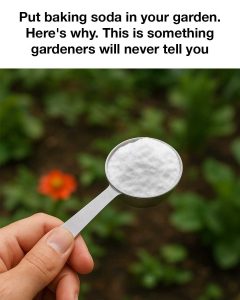Gardening is one of those hobbies that’s good for the soul. It brings peace, beauty, and often a delicious reward right to your backyard. But let’s be honest—keeping a garden healthy isn’t always easy. From fighting off pests to managing soil issues and preventing plant diseases, the challenges can feel endless. While many people immediately reach for chemical products to solve these problems, there’s a simple, affordable, and all-natural option that you probably already have sitting in your kitchen: baking soda.

Baking soda, or sodium bicarbonate, is widely known for its ability to clean and deodorize in households across America. But its value doesn’t stop at the kitchen sink. In fact, baking soda can be a surprisingly powerful tool in your garden. It can help control common pests, balance your soil’s pH levels, and even improve the overall health and look of your plants. If you’re aiming for a garden that thrives without relying on synthetic chemicals, it might be time to take a closer look at what baking soda can do.
First off, baking soda makes an excellent natural pest repellent. It disrupts the internal pH balance of many soft-bodied insects, which eventually leads to their elimination. To create your own DIY pest control spray, mix one tablespoon of baking soda, one tablespoon of vegetable oil, and a teaspoon of liquid soap in a gallon of water. Spray this mixture on your plants in the early morning or late afternoon to protect them from aphids, spider mites, and similar pests. Make sure you don’t spray under intense sunlight, as it can burn your plants’ leaves.
Another common problem in gardens is fungus, particularly powdery mildew and other fungal infections. These diseases can quickly damage or kill plants if left untreated. Thanks to its alkaline nature, baking soda creates an environment that fungi struggle to survive in. To fight off fungus, dissolve a tablespoon of baking soda in a gallon of water, and add a few drops of liquid soap so the solution sticks to the leaves. Spray thoroughly, covering both the tops and bottoms of the leaves, and reapply every seven to ten days until the infection is under control.
Soil health is at the core of every successful garden, and that includes maintaining the right pH levels. Some plants thrive in more alkaline conditions, and baking soda can help if your soil is too acidic. To test your soil, mix a bit of it with water and then add a pinch of baking soda. If it fizzes, that’s a sign of high acidity. To raise the pH, lightly sprinkle baking soda over the soil and water it in. Just be cautious—overdoing it can make the soil too alkaline and harm your plants instead of helping them.
Dealing with weeds? We all know how stubborn they can be. Baking soda offers a natural weed control method. It’s especially effective on small or young weeds due to its high sodium content, which dehydrates the plant. Wet the weeds first, then sprinkle a generous amount of baking soda directly on the leaves and stems. But avoid using it near your desirable plants, as it can affect them too. This method is best reserved for cracks in sidewalks or driveways, or areas where weeds are isolated.
Composting is a great way to recycle kitchen and yard waste, but sometimes compost piles can get too acidic and start to smell unpleasant. Baking soda can help neutralize the odor and balance the acidity. Just sprinkle a light layer over the compost to help manage smells and maintain better decomposition. Be sure not to use too much though—excess baking soda can disrupt the microbial balance and slow the composting process.
Sometimes gardens can develop unpleasant smells, especially near poorly drained areas or compost heaps. If you’re dealing with odors that won’t go away, baking soda might be your answer. Spread a light layer over the problem area and let it sit for a few hours before watering it in. This helps absorb the odor and leaves the area fresher and more pleasant to spend time in.
Using baking soda regularly can also boost your plants’ overall health. Its antifungal properties reduce the risk of infections, and when used properly in the soil, it can improve nutrient availability. For general plant maintenance, mix one teaspoon of baking soda with a quart of water and spray it on your plants every few weeks. This can help prevent problems before they start and give your plants a better chance to thrive.
Clean tools are essential for a healthy garden. Dirty or rusty tools can spread disease from one plant to another. Fortunately, baking soda is a great natural cleaner. Mix it with water to make a paste, apply it to your tools, and scrub with a brush. Rinse thoroughly and dry to prevent rust. Doing this regularly helps keep your tools in good shape and your plants safe from contamination.
Flower color can also be influenced by the pH of your soil. In particular, hydrangeas are known for changing color depending on the acidity. If you’re aiming for more pink in your blooms, which thrive in alkaline conditions, try adding baking soda to the soil around the plant. This simple step can gently shift the pH and encourage those bright, cheerful pink flowers to develop.
Lastly, if ants are invading your garden, baking soda provides a safe and non-toxic solution. Mix equal parts of baking soda and powdered sugar, then sprinkle the mixture around ant trails and nests. The sugar draws the ants in, while the baking soda interferes with their digestive systems. This is a pet- and kid-friendly method that’s especially useful in family gardens where safety is a priority.
For those struggling with slugs, baking soda can act as an eco-friendly deterrent. Just sprinkle a thin barrier of baking soda around plants that slugs are attracted to. The rough texture and alkaline nature keep the slugs away without the need for commercial slug repellents. Reapply after rain or watering for continued protection.
Baking soda may seem like a humble product, but in the garden, it offers a wealth of uses that are simple, effective, and environmentally friendly. Whether you’re battling pests, boosting plant health, or just trying to deodorize a compost pile, it’s worth keeping a box in your gardening shed.




